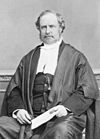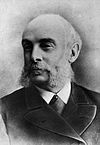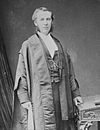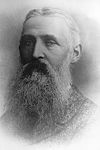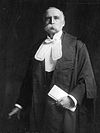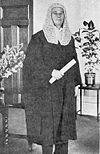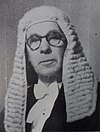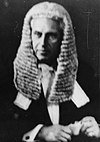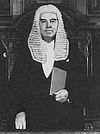
The House of Commons is the lower house of the Parliament of the United Kingdom. Like the upper house, the House of Lords, it meets in the Palace of Westminster in London, England. The House of Commons is an elected body consisting of 650 members known as members of Parliament (MPs). MPs are elected to represent constituencies by the first-past-the-post system and hold their seats until Parliament is dissolved.

The politics of New Zealand function within a framework of an independent, unitary, parliamentary democracy. The system of government is based on the Westminster system, and the legal system is modelled on the common law of England. New Zealand is a constitutional monarchy in which King Charles III is the sovereign and head of state, while his prime minister serves as the head of government.
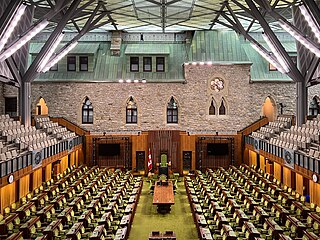
The House of Commons of Canada is the lower house of the Parliament of Canada. Together with the Crown and the Senate of Canada, they comprise the bicameral legislature of Canada.

The Speaker of the House of Commons is the presiding officer of the House of Commons, the lower house and primary chamber of the Parliament of the United Kingdom. The current speaker, Sir Lindsay Hoyle, was elected Speaker on 4 November 2019, following the retirement of John Bercow. Hoyle began his first full parliamentary term in the role on 17 December 2019, having been unanimously re-elected after the 2019 general election.

The speaker of the Australian House of Representatives is the presiding officer of the Australian House of Representatives, the lower chamber within the Parliament of Australia. The counterpart in the upper house is the president of the Senate. The office of the speakership was established in 1901 by section 35 of the Constitution of Australia. The primary responsibilities of the office is to oversee house debates, determine which members may speak, maintain order and the parliamentary and ministerial codes of conduct during sessions and uphold all rules and standing orders. The current speaker of the House of Representatives is Milton Dick, who was elected on 26 July 2022.

The New Zealand Parliament is the unicameral legislature of New Zealand, consisting of the Sovereign (King-in-Parliament) and the New Zealand House of Representatives. The King is usually represented by his governor-general. Before 1951, there was an upper chamber, the New Zealand Legislative Council. The New Zealand Parliament was established in 1854 and is one of the oldest continuously functioning legislatures in the world. It has met in Wellington, the capital of New Zealand, since 1865 and in its current building since 1922.

The House of Representatives is the sole chamber of the New Zealand Parliament. The House passes laws, provides ministers to form Cabinet, and supervises the work of government. It is also responsible for adopting the state's budgets and approving the state's accounts.

The speaker of a deliberative assembly, especially a legislative body, is its presiding officer, or the chair. The title was first used in 1377 in England.

Sir Trevor Colin Mallard is a New Zealand politician. He currently serves as Ambassador of New Zealand to Ireland since 2023. He was a Member of Parliament from 1984 to 1990 and again from 1993 to 2022. He served as Speaker of the New Zealand House of Representatives from 2017 until 2022.

Sir David Cunningham Carter is a New Zealand National Party politician who served as the 29th Speaker of the New Zealand House of Representatives from 2013 to 2017 and as a Cabinet Minister in the Fourth and Fifth National Governments. He represented the Selwyn electorate in the 44th Parliament and the Banks Peninsula electorate in the 45th Parliament. He served as a list MP from 1999 until he retired at the 2020 election.
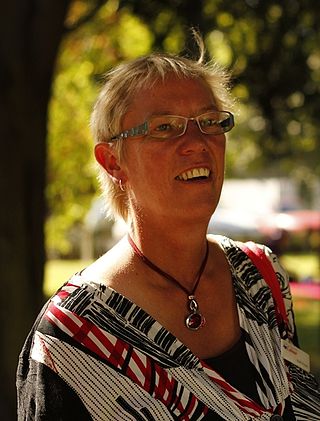
Ruth Suzanne Dyson is a former New Zealand politician. She was a Labour Party Member of Parliament from 1993 to 2020. She represented the Port Hills electorate from the 2008 election election to 2020. She also held a number of senior offices in the Labour Party, including president.
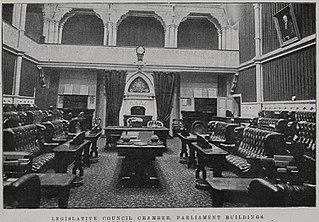
The New Zealand Legislative Council was the upper house of the General Assembly of New Zealand between 1853 and 1951. An earlier arrangement of legislative councils for the colony and provinces existed from 1841 when New Zealand became a colony; it was reconstituted as the upper house of a bicameral legislature when New Zealand became self-governing in 1852, which came into effect in the following year.

The 48th New Zealand Parliament was a term of the Parliament of New Zealand. Its composition was determined at a general election held on 17 September 2005. The new parliament met for the first time on 7 November 2005. It was dissolved on 3 October 2008.
The New Zealand Youth Parliament, held once in each term of parliament, is an event used to promote the civic and community engagement of New Zealand youth. The event has been held since 1994, and takes place at the New Zealand Parliament Buildings. The latest Youth Parliament, the 9th Youth Parliament, took place on 16 and 17 July 2019.
The Chairman of Committees was an elected position of the New Zealand House of Representatives. The role existed between 1854 and 1992. The roles of the Chairman of Committees were to deputise for the Speaker, and to chair the House when it was in committee. The role is now carried out by the Deputy Speaker. The role of Chairman of Committees also existed for the Legislative Council.

The 51st New Zealand Parliament was elected at the 2014 general election. This Parliament consists of 121 members and was in place from September 2014 until August 2017, followed by the 2017 New Zealand general election. Following the final vote count John Key was able to continue to lead the Fifth National Government.
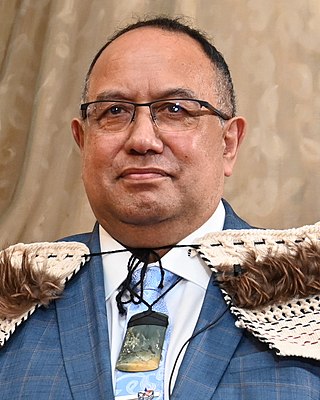
Adrian Paki Rurawhe is a New Zealand Labour Party politician. He has been an MP since 2014, and the speaker of the New Zealand House of Representatives from 2022 to 2023.

Gregory Eamon O'Connor is a New Zealand Labour Party politician and former police officer. He is the Second Assistant Speaker of the New Zealand House of Representatives, and has served as the Member of Parliament for Ōhāriu since the 2017 general election.

Committees of the New Zealand House of Representatives are subsets of the New Zealand House of Representatives which deal with specific tasks delegated to them by the House. The functions of committees include scrutinising draft legislation (bills), conducting inquiries into subjects within their expertise, receiving public comment on matters before them, and overseeing the operation of the public service.

The 53rd New Zealand Parliament was a meeting of the legislature in New Zealand. It opened on 25 November 2020 following the 17 October 2020 general election, and dissolved on 8 September 2023 to trigger the next election. It consisted of 120 members of Parliament (MPs) with five parties represented: the Labour and Green parties, in government, and the National, Māori and ACT parties, in opposition. The Sixth Labour Government held a majority in this Parliament. Jacinda Ardern continued as prime minister until her resignation on 25 January 2023; she was succeeded by Chris Hipkins.







